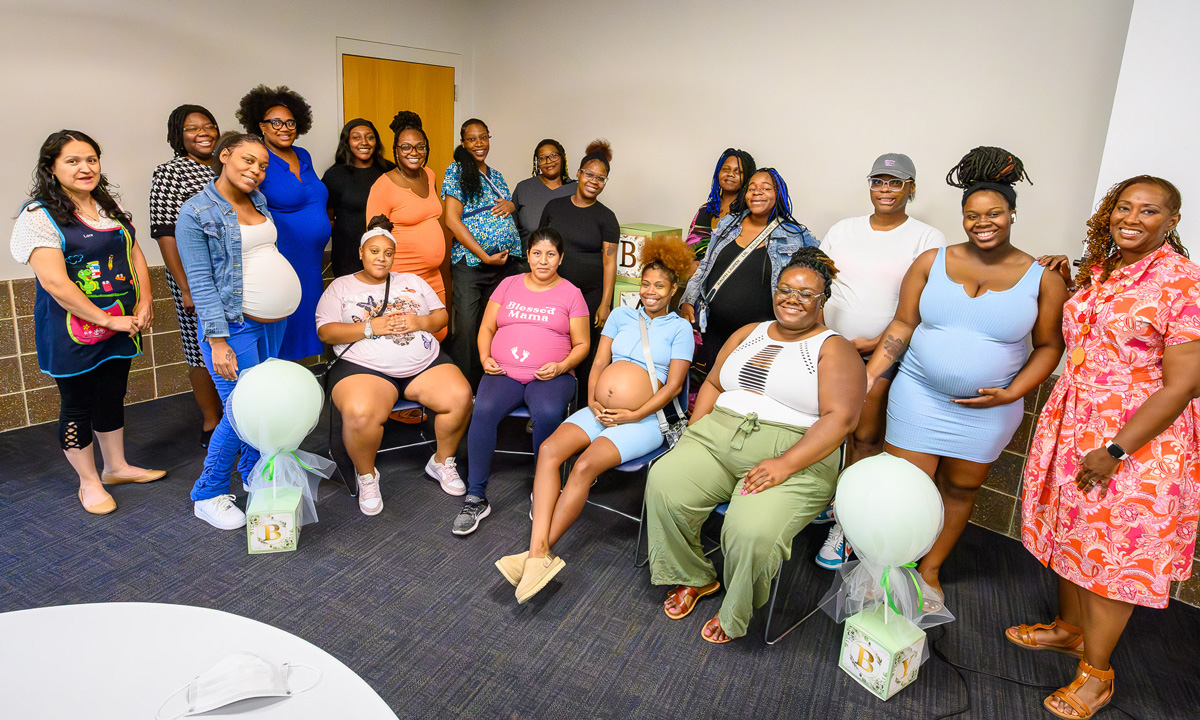Jettaqua Johnson was 22 years old, pregnant with her first child, and worried. The father of her child was incarcerated, and she wasn’t sure what she would need or how she could manage raising a child on her own.
Then her own mother connected her with Show Me Strong Families, an initiative of the St. Louis affiliate of the national Parents as Teachers program. The initiative, which just celebrated its 10th year, connects trained parent educators who conduct every-other-week home visits with families, beginning in the prenatal stage up until the child begins kindergarten.
Johnson immediately bonded with her parent educator, who would bring activities to their visits and check on the baby’s developmental progress and Johnson’s well-being. The educator invited her to Show Me Strong Families events: cooking classes, a first birthday party, and a meetup of parents with similar-aged children. When Johnson wasn’t sure about her child’s development, the parent educator who worked with her to get an evaluation that led to an autism diagnosis and then supportive services. When Johnson became pregnant with her second and third children, the program connected her with a doula to attend the births and provide support through labor and c-sections.
“It made me a better mom,” Johnson said. “I felt like I was safe and there was someone I could call if I needed extra advice about something. They gave me that mindset that I could do it, and they never gave up on me, so I didn’t either.”
The Parents as Teachers program serves 200,000 families through 900 affiliates in all 50 U.S. states, and in 115 Tribal organizations, five other countries, and one U.S. territory. The model has four components: home-based visits, group socialization, health, and developmental screenings for both baby and family — which include screenings for domestic violence and postpartum mood disorders and resource connection. The latter is intended to provide community support so that families can navigate complicated systems, including early intervention screenings, accessing education and housing and safety concerns.
Angela Byas has been working with Parents as Teachers since 2015, first as a parent educator for Show Me Strong Families and now as its affiliate director, training and overseeing other parent educators.
As a parent educator, Byas planned her visits around the milestones the baby was approaching. She brought bubbles to help with language development, beads and string for fine motor skills, or books to promote reading habits, and spent time with the mom discussing how-are-you issues focusing on the health and well-being of the entire family. If a mother expressed an interest in going back to school, or concerns about a developmental delay, or a hardship at home, Byas offered support and resources to help. The visits lasted between an hour and 90 minutes, and Byas averaged 20 families on her caseload — though as a supervisor, she now has fewer.
Byas credits the home visit aspect of Parents as Teachers for facilitating a close connection and high retention rate among families participating. “With a home visit, you’re seeing families in their environment,” she explained. “We don’t go into their home to try and change anything that they have going on in their home. It makes it easier for the children, as well, because we are in their environment.”
Families find the program through word-of-mouth — as Johnson did — or through online research, a referral from the school district, or from brochures left in grocery stores or doctors’ offices. While most of the caregivers are mothers, those raising grandchildren or foster children can enroll, too. There is no cost to families: Program costs are covered by federal and local grants, including money from the Maternal, Infant, and Early Childhood Home Visiting Program at the U.S. Department of Health and Human Services (HHS), and private funds. Parents as Teachers was recently awarded a $7 million operating grant from philanthropist McKenzie Scott and an increase to $15 million in grant funding from Enterprise Mobility’s Road Forward program.
For most of the families, poverty and lack of education make a vulnerable period even more precarious. A spokesperson for Show Me Strong Families estimates that 90% of participants are from low-income backgrounds. The parent educators are trained early childhood professionals, but ultimately what they do is show up, consistently, for families when they are bringing a new baby into the world and are at the highest risk of postpartum depression and a significantly higher risk of poverty. Show Me Strong Families has piloted a doula program, which Johnson participated in, giving families the option to have the doula attend their child birth at no additional charge.
And when a parent educator can help a family identify a problem, they are also able to pivot and offer a road map for early intervention services, helping to offset or reduce delays if properly addressed. Evidence shows that more than half of the children served by the Parents as Teachers program observed with developmental delays overcame these delays by age 3.
The curriculum and the training that parent educators focus on helps them detect early signs of developmental delays and connect families to the appropriate services. This often involves identifying behaviors that may indicate a need for a referral to a health care provider for diagnosis.The nonprofit’s research estimates that parent educators identify approximately 32,000 developmental or health concerns each year.
Byas recalls a mother who enrolled in the program when her child was 8 months old. Byas immediately observed signs that the child might be autistic, but the mother wasn’t convinced and was unwilling to talk about options. As their trust deepened, the mother began asking questions, had her son evaluated, and found an early intervention program, as well as support services through the local school district.
Group socialization is another component of the program, aiming to shore up community support and help mothers connect with one another. This includes celebrating milestones like a child’s first birthday, which is especially important given the grim statistic that infant mortality rates are far higher for families in poverty.
“We like to recognize them and celebrate that they made it through that little phase where it is crucial,” said Byas. This past December, the birthday theme was PBS Kids’ cartoon character Daniel Tiger, complete with hats, cupcakes and games.
A Future with Uncertain Federal Funding
Like any social services program funded by government dollars, the Parents as Teachers program faces some uncertainty surrounding the deep federal budget cuts and how they will affect early education. Constance Gully, the organization’s president and CEO estimates that 30% to 40% of the programs receive federal funding through HHS. “It’s authorized by Congress, and we expect it to continue.”
Gully points to the evidence of their programs’ success: an improvement in positive parenting practices, fewer maltreatment reports, reduced child protective services reinvolvement, and improved factors like parental resilience and children’s social-emotional competence. The families involved are more likely to gain employment, pursue higher education, and improve family economic self-sufficiency. Families also show greater awareness and use of financial resources like the Earned Income Tax Credit, while reducing neglect.
“The return on investment from early childhood is not forgotten — on families and children and the workforce in general. We have had the privilege for many years of bipartisan and bicameral support,” Gully said. “We are all on pins and needles and hope that the return on investment in early childhood doesn’t get lost in translation with all these cuts.”

Rebecca Gale
Rebecca Gale is a writer with the Better Life Lab at New America where she covers child care. Follow her on Instagram at @rebeccagalewriting, and subscribe to her Substack newsletter, "It Doesn't Have to Be This Hard."



